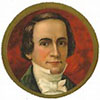
By: James G. Apple, Editor-in-Chief, International
Judicial Monitor
Currently the United States is not viewed as a world leader
in the promulgation and acceptance of international law. However it
has not always been that way. The “founding fathers” of the
United States, including such notable figures as Chief Justice John
Marshall, Presidents Thomas Jefferson and James Madison and first Secretary of
the Treasury Alexander Hamilton, in the late 18th and early 19th Centuries, were all schooled in the then prevailing principles and
applications of international law, recognized its validity as part of the
law of the United States, and encouraged its development in the new
nation. And they were followed by distinguished jurists and lawyers on into the 19th Century.
One such lawyer and jurist was Henry Wheaton, whose most
notable contribution to the law of nations, as international law was
first known, was two seminal books on the subject: Elements of
International Law (1836) and A History of the Law of Nations in Europe and America (1838). Both of these books achieved high rankings and were widely
read in the legal communities of the new world.
Wheaton was a New Englander, having been born in Rhode
Island in 1785. He attended and graduated from Rhode Island College, which
is now Brown University, in 1802, followed by apprenticeships with
local lawyers in preparation for admittance to the Rhode Island
Bar, which he achieved in 1805. After two years of study in the United
Kingdom, he returned to Rhode Island for the opening of his law practice
and the beginning of other legal activities.
Some of the activities in which he engaged in the following
22 years were:
Private law practice in Providence (RI) and New
York City

 International
Judicial Monitor
International
Judicial Monitor